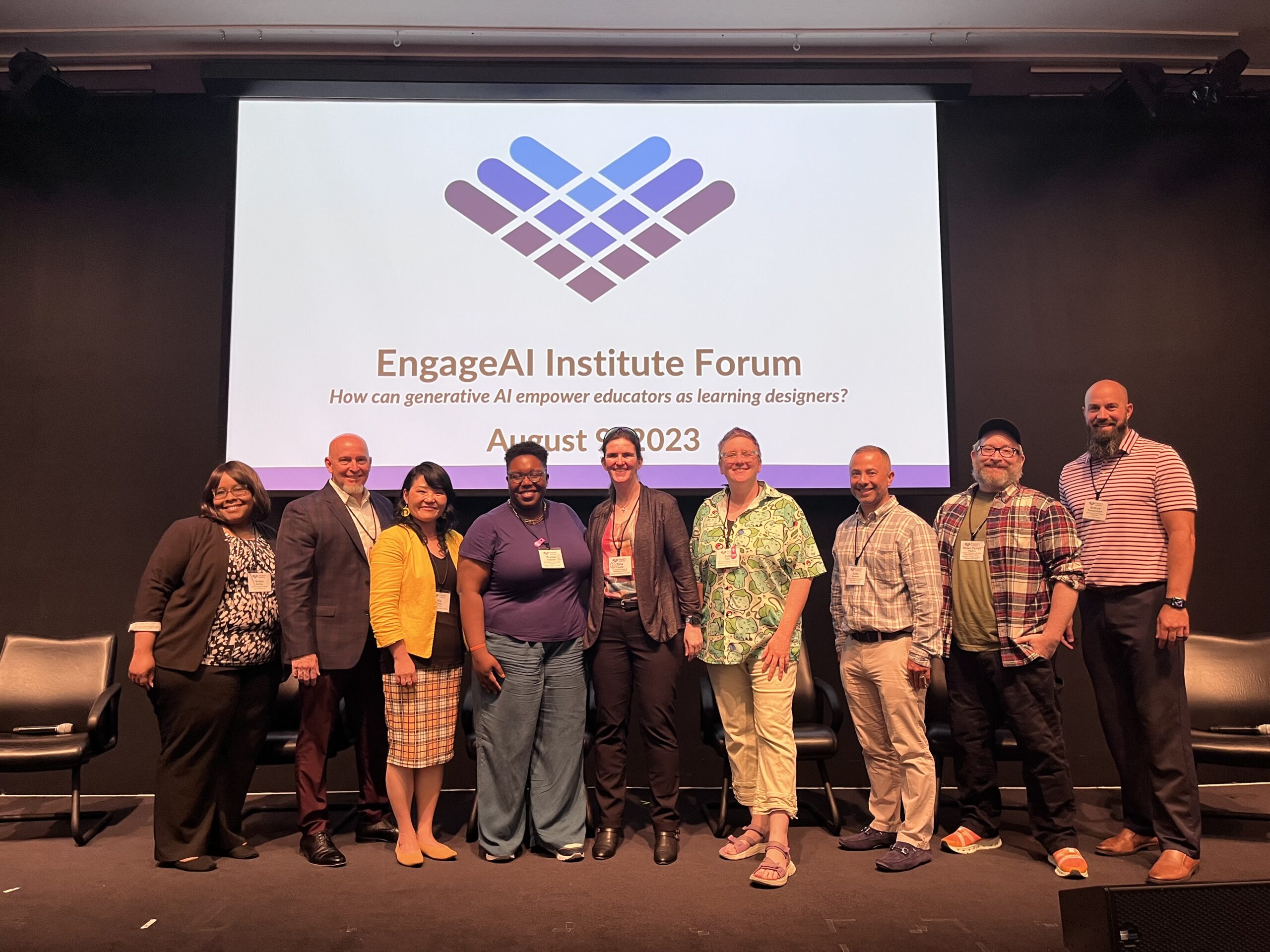By Pati Ruiz
Key Ideas
- Educators called for more and varied professional learning opportunities and materials
- Educators and researchers identified misconceptions and limitations of how AI tools work
- The EngageAI Practitioner Advisory Board are co-designing professional learning materials
“There seems to be collective buy-in that AI has great potential for disrupting the outdated narrative of education. However, over and over it has been highlighted that teachers need to have professional learning on AI. We need support across the educational landscape to grow teacher capacity around AI.” – EngageAI Institute Forum Participant
On August 9, 2023, the National Science Foundation funded EngageAI Institute hosted a national forum with 80 educational practitioners, researchers, developers, and funders in attendance. The day-long event at the Computer History Museum in Mountain View, California focused on the guiding question: how can generative AI empower educators as learning designers?
Participants, including our Practitioner Advisory Board members, collaborated at roundtables with a mix of educators, researchers, and community members to discuss the development of AI tools and systems that meet the needs of educators, students, and their communities. Talking with educators helped participants understand the need to better prepare educators for teaching about and with AI systems and tools. Overall, educators called for more and varied professional learning opportunities and materials that will help their communities work towards safer, more responsible and equitable implementations of AI. In this post, we share three things we are doing at EngageAI Nexus to support educators as they grow their capacity to teach with and about AI.
Existing Work
Our team has been working to develop materials for educators to use and engage with. Blog posts are one way we share these materials. Two examples are the Glossary of Artificial Intelligence Terms for Educators written by Dr. Pati Ruiz and Dr. Judi Fusco, as well as Dr. Fusco’s Quick Start Guide for Understanding ChatGPT which she wrote as a way to begin to demystify ChatGPT so that educators can see limitations and learn how to work with it.
Another example of our existing work is that of Dr. Tiffany Barnes, who has worked with a team to develop a workshop for educators who are looking to integrate Generative AI into their classrooms. During a series of four workshops, the NC State team shared knowledge and skill building lessons with teachers and encouraged them to design their own lessons to help their students understand the capabilities and limitations of ChatGPT, specifically. The team uploaded videos and slides from each workshop.
Addressing Misconceptions
Participants at the EngageAI Forum identified misconceptions and limitations of how AI tools work. For example, one educator did not realize that by inputting a students’ personal identifiable information, like individualized education program (IEP) content, into ChatGPT presents a variety of privacy and data security issues. Another misconception among educators and some researchers alike is that Generative AI tools are good for answering any type of question or prompt. Researchers who had experience bridging the research-practice gap found it necessary to explain to participants that Generative AI tools are not actually designed to do some things, such as organizing data or doing math. This is explained in detail in Dr. Judi Fusco’s Quick Start Guide for Understanding ChatGPT where she writes that she “won’t use it for anything where I need to be certain that the writing is accurate and truthful.” Much more has been written about Generative AI tools hallucinating and being inaccurate and it’s important to share these issues with educators as we help them develop expertise in AI literacy. Another way we can do this is by co-designing tools and examples of professional learning experiences with educators.
Sharing Co-Designed Professional Learning Tools and Examples
“It is vitally important to our teachers that we keep them in the loop. Many times teachers don’t realize how AI has already been infused in their classrooms” – Nneka McGee, EngageAI Practitioner Advisory Board Member
As we’ve learned from colleagues Kristal Brister Philyaw and Maria Romero, among others, powerful and accessible learning experiences for educators require intentional design. In these professional learning opportunities, the needs of educators need to be balanced with the outcomes of the work and the technical understandings of the systems we are working with. To this end, the EngageAI Practitioner Advisory Board members will be working to adapt AI literacy resources originally developed by Dr. Victor Lee and the Classroom-Ready Resources About AI For Teaching (CRAFT) team at the Stanford Graduate School of Education for use with educators. Originally serving as a collaboration between the Graduate School of Education and Institute for Human-Centered AI; the CRAFT materials were originally designed to be taught in high school classrooms to help students explore, understand, question, and critique AI. CRAFT intentionally pursued a multidisciplinary approach so educators with a variety of discipline backgrounds can teach about AI and we hope to engage in similar co-design methods to adapt the content for educator professional learning experiences. The EngageAI Practitioner Advisory Board will review the existing CRAFT materials and use them as a foundation for developing professional learning trainings including materials like one page guidance documents, facilitation slide decks, and practice activities.
If you’re passionate about AI literacy for teaching with and about AI please sign up for the EngageAI mailing list to join this important conversation.

